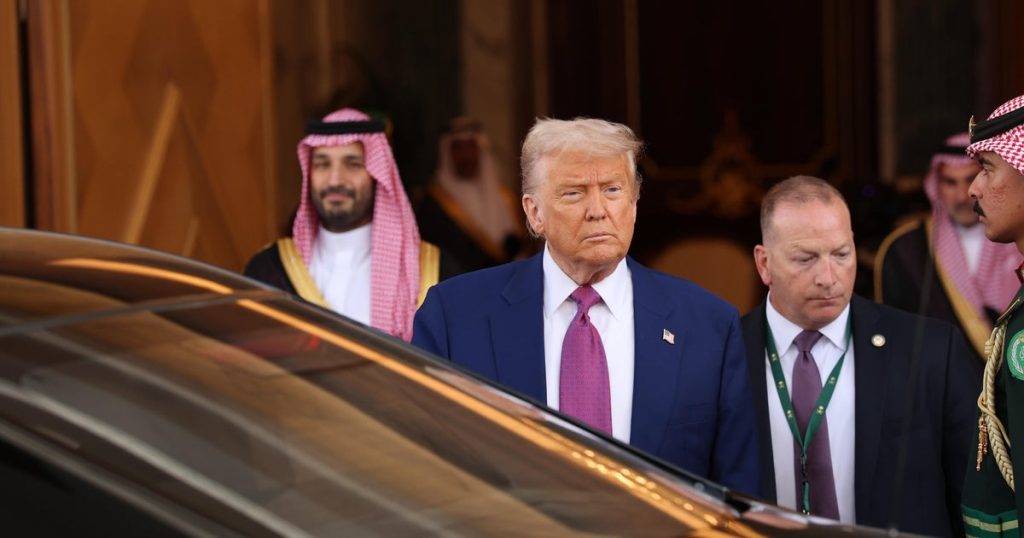In a significant turn of events, President Trump announced plans to normalize relations with Syria’s new government and lift sanctions, aiming to provide the country with “a chance at peace.” This announcement came ahead of his meeting with Syrian President Ahmad al-Sharaa in Saudi Arabia, facilitated by officials from both Saudi Arabia and Turkey. The shift in U.S. policy presents a crucial moment for Syria, which has been embroiled in civil conflict for over a decade.
| Article Subheadings |
|---|
| 1) Trump’s New Approach to Syria |
| 2) The Rising Influence of al-Sharaa |
| 3) The Gulf Allies’ Position |
| 4) Complications with U.S.-Israel Relations |
| 5) The Broader Impact of the Meeting |
Trump’s New Approach to Syria
On Tuesday, President Trump unveiled his intention to establish diplomatic relations with Syria’s new government, focusing on lifting existing sanctions that have hindered the country’s recovery efforts. This statement marks a notable pivot in U.S. foreign policy, departing from the previous administration’s stance that had predominantly supported opposition forces against the Assad regime. President Trump emphasized this initiative as a crucial move towards fostering stability in the region, saying, “There is a new government that will hopefully succeed.” The shift is expected to alter the dynamics among key stakeholders involved in Syria’s lengthy conflict.
The Rising Influence of al-Sharaa
President Ahmad al-Sharaa, who led the overthrow of former leader Bashar Assad, has emerged as a controversial yet pivotal figure in Syria’s political landscape. Initially recognized as an insurgent leader, al-Sharaa was officially elected president in January, following a rapid military offensive by his group, Hayat Tahrir al-Sham (HTS), that ousted Assad from power. His leadership is viewed as a potential turning point for a nation that has suffered for over a decade amid a civil war. However, skeptics raise concerns over his past associations with extremist groups and his earlier role as a combatant against U.S. forces in Iraq, during which he garnered a significant bounty for information leading to his capture. This complex backdrop complicates the ongoing efforts for normalization with his government.
The Gulf Allies’ Position
The shifting allegiance towards al-Sharaa’s administration has garnered substantial support from Gulf nations, which perceive the new government as a bulwark against Iranian influence in the region. As Iran maintained a critical role in supporting Assad’s regime throughout the Syrian civil conflict, Gulf leaders are keen on a decisive U.S. response that aligns with their interests. These leaders have urged Trump to recognize the new government officially, believing that a stable Syria under al-Sharaa would help counteract the resurgence of Iranian power. Officials in the region anticipate that the meeting between Trump and al-Sharaa could solidify a common front against shared adversaries, particularly Iran, thereby shaping the geopolitical landscape.
Complications with U.S.-Israel Relations
This newfound engagement with al-Sharaa’s government has sparked considerable apprehension among traditional U.S. allies, notably Israel. Israeli officials have expressed skepticism regarding al-Sharaa’s past affiliations with extremist groups and maintain concerns about legitimizing a leader with such a controversial background. The Israeli government has cautioned against swift recognition of al-Sharaa, marking this U.S. pivot as a potential threat to their national security interests. The tension exemplifies the broader complexities involved in U.S. foreign policy, wherein the need to adapt must balance against historical alliances and regional security concerns.
The Broader Impact of the Meeting
As President Trump prepares to meet al-Sharaa during his Middle Eastern trip, the implications of this meeting extend beyond Syria and the immediate region. The potential normalization of relations stands to influence U.S. foreign policy significantly, not only reshaping alliances within the Middle East but also offering insight into how the U.S. engages with governments arising from complex and often violent transitions of power. Trump’s visit to Saudi Arabia, coupled with discussions around substantial investment deals, reflects a broader narrative in which economic partnership and political diplomacy intertwine as essential elements in the quest for regional stability.
| No. | Key Points |
|---|---|
| 1 | President Trump announced plans to normalize relations with Syria’s new government. |
| 2 | Ahmad al-Sharaa, a former insurgent, has become president, marking a shift in power in Syria. |
| 3 | Gulf leaders advocate for U.S. recognition of al-Sharaa to counteract Iranian influence. |
| 4 | Israel remains cautious about quickly recognizing the new Syrian government. |
| 5 | The meeting could reshape U.S. foreign policy and regional alliances significantly. |
Summary
President Trump’s decision to engage with Syria’s new leadership heralds a pivotal moment for U.S. foreign policy in the Middle East. This move not only aims to foster stability within Syria but also represents a balancing act of interests among various stakeholders, including Gulf allies and Israel. The outcome of Trump’s discussions with al-Sharaa may significantly impact the geopolitical dynamics of the region and shape the future direction of U.S. involvement in Middle Eastern affairs.
Frequently Asked Questions
Question: Who is Ahmad al-Sharaa?
Ahmad al-Sharaa is the newly elected president of Syria, known for leading the insurgent group Hayat Tahrir al-Sham during the overthrow of Bashar Assad’s government.
Question: Why is there concern about normalizing relations with al-Sharaa?
Concerns arise due to al-Sharaa’s past affiliations with extremist groups and his previous role in insurgency against U.S. forces, which make many skeptical of his leadership.
Question: How has Trump’s announcement affected U.S.-Israel relations?
Trump’s announcement to engage with al-Sharaa’s government has raised alarms in Israel, leading officials to caution against swift recognition, citing security concerns regarding Al-Sharaa’s radical past.



